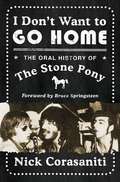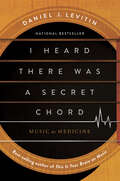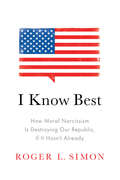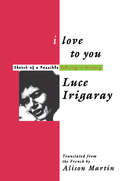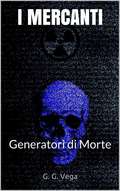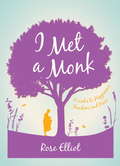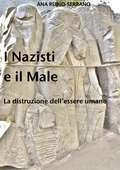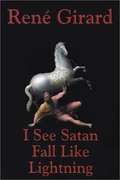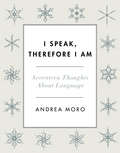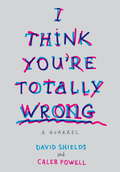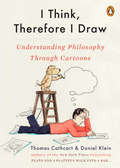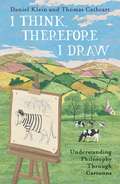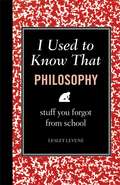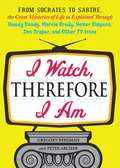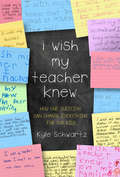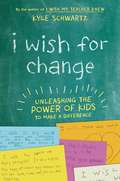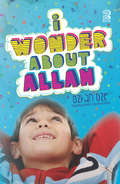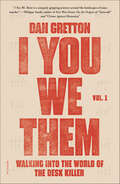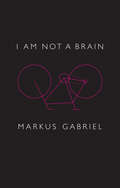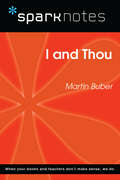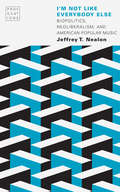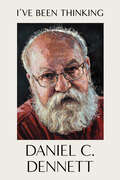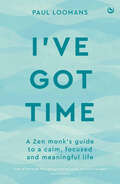- Table View
- List View
I Don't Want to Go Home: The Oral History of the Stone Pony
by Nick CorasanitiA captivating oral history of the iconic music venue the Stone Pony and of the rise, fall, and rebirth of Asbury Park, New Jersey—featuring interviews with Bruce Springsteen, Steve Van Zandt, Southside Johnny, members of the E Street Band and Asbury Jukes, the Ramones, the Jonas Brothers, Jack Antonoff, and other legendary musicians.Featuring exclusive, never-before-seen photos from Danny ClinchIn 1970, Asbury Park, New Jersey, was ripped apart by race riots that left the once-proud beach town an hour away from Manhattan smoldering, suffering and left for dead.Four years later, a few miles down the coast in Seaside Heights, two bouncers, Jack Roig and Butch Pielka, tired of the daily grind, dreamt of owning their own place. Under-prepared and minimally funded, the two bought the first bar they considered, in a city where no one wanted to be, without setting one foot in the place. They named it the Stone Pony, and turned it into a rock club that Bruce Springsteen would soon call home and a dying town would call its beating heart.But the bar had to fight to survive. Despite its success in launching and attracting rockers like Stevie Van Zandt, “Southside” Johnny Lyon, and Springsteen, the Stone Pony—like everything in Asbury Park for the past half century—could only weather the drags of a depressed city for so long.How did the Stone Pony beat the odds to survive? How did it become an international rock pilgrimage site, not just for fans of Springsteen, but for punk rockers, jam bands, pop, indie, alternative and many other musicians as well? And how did it continue to inspire and influence a hall-of-fame list of New Jersey and national rock stars? The story of the Stone Pony—thrillingly charted in this detailed oral history—is the chronicle of a proud and unique cultural mecca blooming in a down-but-not-yet-out tough town. As Nick Corasaniti reveals, the stories of Asbury Park and the Stone Pony are that of modern America itself—a place of battered hopes, big dreams, and dogged resilience.
I Heard There Was A Secret Chord: Music as Medicine
by Daniel J. LevitinNeuroscientist and New York Times bestselling author of This Is Your Brain on Music Daniel J. Levitin reveals how the deep connections between music and the human brain can be harnessed for healing.Music is perhaps one of humanity&’s oldest medicines as well as its most universal: from China to the Ottoman Empire, Europe to Africa and pre-colonial South America, cultures have developed rich traditions for using sound and rhythm to ease suffering, spur healing, and calm the mind. Despite this history, musical therapy has long been considered the remit of ancient practice and alternative medicine, if not outright quackery and pseudoscience. In the last decade, however, an overwhelming body of scientific evidence has emerged that persuasively argues music can offer profoundly effective treatment for a whole host of ailments, from Alzheimer&’s to PTSD, depression, pain, and cognitive injury. It is, in short, one of the most potent and remarkably promising new therapies available today.A work of dazzling ideas, cutting-edge research, and joyful celebration of the human mind, I Heard There Was a Secret Chord explores the critical role music has played in human evolution, illuminating how the story of the human brain is inseparable from the creative enterprise of music that has bound cultures together throughout history. Music insinuates itself into our earliest memories; it is intimately connected to our emotional regulation and cognition; its shared rhythms and sounds are essential to our social behaviors. As neuroscientist Daniel J. Levitin demonstrates in this mind-expanding follow-up to This Is Your Brain on Music—which revolutionized our understanding of the neuroscience of song—medical researchers are now finding that these same deep connections can be harnessed to create profound benefits for those both young and old.
I Heard There Was A Secret Chord: Music as Medicine
by Daniel J. LevitinNeuroscientist and New York Times bestselling author of This Is Your Brain on Music Daniel J. Levitin reveals how the deep connections between music and the human brain can be harnessed for healing.Music is perhaps one of humanity&’s oldest medicines as well as its most universal: from China to the Ottoman Empire, Europe to Africa and pre-colonial South America, cultures have developed rich traditions for using sound and rhythm to ease suffering, spur healing, and calm the mind. Despite this history, musical therapy has long been considered the remit of ancient practice and alternative medicine, if not outright quackery and pseudoscience. In the last decade, however, an overwhelming body of scientific evidence has emerged that persuasively argues music can offer profoundly effective treatment for a whole host of ailments, from Alzheimer&’s to PTSD, depression, pain, and cognitive injury. It is, in short, one of the most potent and remarkably promising new therapies available today.A work of dazzling ideas, cutting-edge research, and joyful celebration of the human mind, I Heard There Was a Secret Chord explores the critical role music has played in human evolution, illuminating how the story of the human brain is inseparable from the creative enterprise of music that has bound cultures together throughout history. Music insinuates itself into our earliest memories; it is intimately connected to our emotional regulation and cognition; its shared rhythms and sounds are essential to our social behaviors. As neuroscientist Daniel J. Levitin demonstrates in this mind-expanding follow-up to This Is Your Brain on Music—which revolutionized our understanding of the neuroscience of song—medical researchers are now finding that these same deep connections can be harnessed to create profound benefits for those both young and old.
I Know Best: How Moral Narcissism Is Destroying Our Republic, If It Hasn't Already
by Roger L. SimonIn 1979, Christopher Lasch published the epochal The Culture of Narcissism warning of the normalizing of narcissism in our society. Lasch may have understated it. 35 years later, in the Obama era-with its parade of endless, often inexplicable, scandals-we have a full blown epidemic of what has recently been called Moral Narcissism.Forget Narcissus and his reflection, Moral Narcissism-the almost schizophrenic divide between intentions and results now pervading our culture-is the new method for feeling good about yourself. It no longer matters how anything turns out as long as your intentions were good, that you were "moral." And, just as importantly, the only determinant of those intentions, the only one who defines that morality, is you.I Know Best goes beyond Lasch to lay bare how this moral narcissism is behind all those scandals from Obamacare to the Veteran's Administration to the IRS, Benghazi, Bergdahl, Syria and beyond. Everything the Obama administration did and does was about making them feel good about themselves-the results be damned.And they have as their allies those supreme moral narcissists in the academy, media and Hollywood, ever willing to ratify those good intentions and ignore those same results.But I Know Best is not just about the Left. Moral Narcissism affects the right as well, even when they don't realize it. It is a true epidemic that must be cured in order to save our democratic republic and our futures.
I Love to You: Sketch of A Possible Felicity in History
by Luce IrigarayIn this book, one of the foremost contemporary scholars in the fields of feminist thought and linguistics, explores the possibility of a new liberating language and hence a new relationship between the sexes. In I Love to You, Luce Irigaray moves from the critique of patriarchy to an exploration of the ground for a possible inter-subjectivity between the two sexes. Continuing her rejection of demands for equality, Irigaray poses the question: how can we move to a new era of sexual difference in which women and men establish lasting relations with one another without reducing the other to the status of object?
I Mercanti
by Guido Galeano Vega Flaminia MiragliaIl proposito di questo libro è rendere consapevole la società, capire e fare tesoro dell'importanza e del valore della vita. È l'umile contributo di questo scritttore emergente. L’educazione appropriata dei valori sociali umani è la priorità nel mondo. Coloro che amministrano e guidano l’economia mondiale, consciamente o inconsciamente, in maniera intenzionale o meno, sono focalizzati sull’industria della morte nel pianeta. Questo si può percepire per tutti gli eventi violenti che la nostra generazione, presumibilmente evoluta, ha sofferto. In un secolo sono stati spesi milioni e milioni in risorse, e sono state uccise milioni e milioni di persone nel pieno della loro età. Apparentemente, una parte dell’umanità ha perso l’amore per la vita, e si sta gettando tra le braccia della morte, come servo volontario per uccidere. Coloro che uccidono sono coloro che fanno in modo che la società non possa ricevere i frutti positivi della produttività globale. Sono coloro che accumulano i frutti dello sforzo e del sacrificio degli altri. Coloro che uccidono sono coloro che investono le risorse del pianeta nell’industria della morte.
I Met A Monk
by Rose ElliotPioneering vegetarian food writer Rose Elliot hones her characteristically warm and engaging narrative style to share her fascinating introduction to Buddhism. Having never truly been convinced on the idea of single, specific, spiritual practice - despite an unusual childhood growing up in a commune and as a granddaughter of a Medium - Rose discovered Buddhism much later on in her life and now she shares her positive experience and how it may benefit you, too. Part autobiography, part self-help book, I Met a Monk forms a series of workshops, structured into eight chapters that cover the weekly discussions held between a Buddhist monk, Rose, and a group of men and women, including a student, a hairdresser, a doctor and a grandmother, where they talk about the Buddhist way to finding happiness, freedom and peace. Beginning with an introduction to mindfulness meditation and the simple core tenants of the Buddhist philosophy, the book introduces the Four Noble Truths that Buddhist teaching is based on, and how they appeal to life in the 21st century and hold within them everything we need for a happy and fulfilled life. Each chapter ends with a concise summary of the important points and recommended exercises to build a working knowledge of how to put Buddhism into practice.
I Nazisti e il Male. La distruzione dell'essere umano
by Daniela Giovannetti Ana Rubio-SerranoIl nazismo spalancò le porte al terrorismo globalizzato. Ideò un male strutturale dove nessuno era in salvo neanche il popolo tedesco. Il nemico: tutti coloro che pensavano con una loro testa in maniera libera e diversa rispetto a coloro che dettavano le regole naziste. Gli ariani erano solo "individui fabbricati", ideati per la violenza, ossia automi intelligenti disumanizzati. La socializzazione del crimine attraverso la violenza diventata cultura fu uno degli obiettivi raggiunti sia nei campi di concentramento che nella società. Un libro che mette in luce questioni ancora oggi attuali più che mai.
I See Satan Fall Like Lightning
by Rene Girard James G. WilliamsRene Girard holds up the gospels as mirrors that reveal our broken humanity, and shows that they also reflect a new reality that can make us whole. Like Simone Weil, Girard looks at the Bible as a map of human behavior, and sees Jesus Christ as the turning point leading to new life. The title echoes Jesus' words: "I saw Satan falling like lightning from heaven". Girard persuades us that even as our world grows increasingly violent the power of the Christ-event is so great that the evils of scapegoating and sacrifice are being defeated even now. A new community, God's nonviolent kingdom, is being realized -- even now.
I Speak, Therefore I Am: Seventeen Thoughts About Language
by Andrea MoroThere are no men so dull and stupid, not even idiots, as to be incapable of joining together different words, and thereby constructing a declaration by which to make their thoughts understood.... On the other hand, there is no other animal, however perfect or happily circumstanced which can do the like.—DescartesLanguage is more like a snowflake than a giraffe's neck. Its specific properties are determined by laws of nature, they have not developed through the accumulation of historical accidents.—Noam ChomskyIn I Speak, Therefore I Am, the Italian linguist and neuroscientist Andrea Moro composes an album of his favorite quotations from the history of linguistics, beginning with the Book of Genesis and the power of naming and concluding with Noam Chomsky's metaphor that language is a snowflake. Moro's seventeen linguistic thoughts and his commentary on them display the humanness of language: our need to name and interpret this world and create imaginary ones, to express and understand ourselves. This book is sure to delight anyone who enjoys the ineffable paradox that is human language.
I Think You're Totally Wrong
by David Shields Caleb PowellAn impassioned, funny, probing, fiercely inconclusive, nearly-to-the-death debate about life and art--beers included.Caleb Powell always wanted to become an artist, but he overcommitted to life (he's a stay-at-home dad to three young girls), whereas his former professor David Shields always wanted to become a human being, but he overcommitted to art (he has five books coming out in the next year and a half). Shields and Powell spend four days together at a cabin in the Cascade Mountains, playing chess, shooting hoops, hiking to lakes and an abandoned mine; they rewatch My Dinner with André and The Trip, relax in a hot tub, and talk about everything they can think of in the name of exploring and debating their central question (life and/or art?): marriage, family, sports, sex, happiness, drugs, death, betrayal--and, of course, writers and writing.The relationship--the balance of power--between Shields and Powell is in constant flux, as two egos try to undermine each other, two personalities overlap and collapse. This book seeks to deconstruct the Q&A format, which has roots as deep as Plato and Socrates and as wide as Laurel and Hardy, Beckett's Didi and Gogo, and Car Talk's Magliozzi brothers. I Think You're Totally Wrong also seeks to confound, as much as possible, the divisions between "reality" and "fiction," between "life" and "art." There are no teachers or students here, no interviewers or interviewees, no masters in the universe--only a chasm of uncertainty, in a dialogue that remains dazzlingly provocative and entertaining from start to finish.James Franco's adaptation of I Think You're Totally Wrong into a film, with Shields and Powell striving mightily to play themselves and Franco in a supporting role, will be released later this year. From the Hardcover edition.
I Think, Therefore I Draw: Understanding Philosophy Through Cartoons
by Thomas Cathcart Daniel KleinA hilarious new exploration of philosophy through cartoons from the duo who brought you the New York Times bestselling Plato and a Platypus Walk Into A Bar...Thomas Cathcart and Daniel Klien have been thinking deep thoughts and writing jokes for decades, and now they are here to help us understand Philosophy through cartoons, and cartoons through Philosophy. Covering topics as diverse as religion, gender, knowledge, morality, and the meaning of life (or the lack thereof), I Think, Therefore I Draw gives a thorough introduction to all of the major debates in philosophy through history and the present. And since they explain with the help of a selection of some of the smartest cartoonists working today, you'll breeze through these weighty topics as you guffaw and slap your knee. Cathcart and Klein's Plato and a Platypus Walk into a Bar... and Heidegger and a Hippo Walk Through Those Pearly Gates have been a favorite of philosophers and non-philosophers alike for years. Packed with dozens of witty cartoons and loaded with profound philosophical insight, I Think, Therefore I Draw will delight readers and leave them enlightened.
I Think, Therefore I Draw: Understanding Philosophy Through Cartoons
by Thomas Cathcart Daniel KleinWhat makes you think you know what you think you know? What if your right is my wrong? Is it now yet? Like the best comedians, the best cartoonists address philosophy&’s Big Questions. Covering topics as diverse as religion, gender, knowledge, morality and the meaning of life (or the lack thereof), I Think, Therefore I Draw is a joyous introduction to the major debates in philosophy through history and the present. Wittgenstein once said that a serious and good philosophical work could be written that would consist entirely of jokes. Let&’s put that to the test…
I Used to Know That: Philosophy
by Lesley Levene"All are lunatics, but he who can analyze his delusions is called a philosopher." -Ambrose Bierce, EpigramsIf a tree falls and no one hears it, does it make a sound? I Used to Know That: Philosophy examines this and many other related questions. Spanning over some two-and-a-half thousand years of philosophical thought, this book covers the main highlights, from Pythagoras and Heraclitus, to Socrates, Plato, and Aristotle, to Descartes, Kierkegaard, Marx, and Sartre. From the Socratic method to structuralism, you'll get an overview of all the major theories, presented in an easy-to-understand and engaging format. This lively, fun-to-read compendium explains how philosophy began and uncovers the thinkers and movements that have used it in both brilliant and frightening ways. It includes: Short biographies of all the great philosophers, from the early Greeks to the modern greats All the main -isms and -ologies, from atomism to utilitarianism, via epistemology and ontology Quips, quotes, and conundrums to impress your friends at your next dinner partySo if you ever paused to wonder about the origin of the phrase "platonic love" or why Nietzsche came to believe that "God is dead," this is the book for you. It will refresh and enlighten you, and it may even make you stop and reflect on the larger questions of life. Because after all, as Socrates said, "the unexamined life is not worth living."
I Watch, Therefore I Am: From Socrates to Sartre, the Great Mysteries of Life as Explained Through Howdy Doody, Marcia Brady, Homer Simpson, Don Draper, and other TV Icons
by Gregory Bergman<P>Let Gilligan's Island teach you about situational ethics. Learn about epistemology from The Brady Bunch. <P>Explore Aristotle's Poetics by watching 24. <P>Television has grappled with a wide range of philosophical conundrums. According to the networks, it's the ultimate source of all knowledge in the universe! <P><P>So why not look to the small screen for answers to all of humanity's dilemmas?There's not a single issue discussed by the great thinkers of the past that hasn't been hashed out between commercials in shows like Mad Men and Leave It to Beaver. So fix yourself a snack, settle into the couch, grab the remote...and prepare to be enlightened.
I Wish My Teacher Knew: How One Question Can Change Everything for Our Kids
by Kyle SchwartzOne day, third-grade teacher Kyle Schwartz asked her students to fill-in-the-blank in this sentence: "I wish my teacher knew _____.” The results astounded her. Some answers were humorous, others were heartbreaking-all were profoundly moving and enlightening. The results opened her eyes to the need for educators to understand the unique realities their students face in order to create an open, safe and supportive place in the classroom. When Schwartz shared her experience online, #IWishMyTeacherKnew became an immediate worldwide viral phenomenon. Schwartz's book tells the story of #IWishMyTeacherKnew, including many students' emotional and insightful responses, and ultimately provides an invaluable guide for teachers, parents, and communities.
I Wish for Change: Unleashing the Power of Kids to Make a Difference
by Kyle SchwartzFrom the author of I Wish My Teacher Knew, how grownups can empower children to stand up for what they believe inThird-grade teacher Kyle Schwartz often tells her students: "You are not here so you can make money in a decade. You are here so you can make a difference now."Young people are up for the task. In the face of school shootings, cyber bullying, and other challenges students face at school, there are students who are changing the world right now.In I Wish for Change, teacher and author Kyle Schwartz equips both teachers and parents to help children stand up for what they believe is right and make value-driven decisions. She shows how children's adaptability, vulnerability, and empathy make them excellent agents for change, as well as how to teach children about the mechanics and structures of power so they can effectively change them.Filled with inspiring stories from Kyle's students and educators around the nation, as well as practical, replicable strategies for the classroom, I Wish for Change is the guide for every teacher, educator, and parent to show kids that their voice matters.
I Wonder About Allah
by Selma Ayduz Ozkan OzeHave you ever wondered about Allah? Have you ever wanted to ask why Allah created the universe and humans? Why some people are beautiful, ugly, disabled, or ill? These questions, and many more, are explored inside.Ozkan Oze was born in Turkey in 1974. While at high school, he started working at Zafer Magazine's editorial office in Istanbul and discovered his love of literature and books. Since then he has gone on to become the editor of Zafer Publications Group and continually writes. He is married with two children.
I You We Them, Vol. 1: Walking into the World of the Desk Killer (I You We Them)
by Dan GrettonA “powerful” historical investigation into crimes against humanity—and those who give the orders from the safety of their desks (The Spectator).A Washington Post Notable Nonfiction Book of the YearA Spectator (UK) Best Book of the YearI You We Them is an unprecedented study of the perpetrators of crimes against humanity: the “desk killers” who ordered and directed some of the worst atrocities of the modern era. From Albert Speer’s complicity in Nazi barbarism to Royal Dutch Shell’s role in the murders of Nigerian activist Ken Saro-Wiwa and the rest of the Ogoni Nine, Dan Gretton probes the depths of the figure who, by giving orders, uses paper or a phone or a computer to kill, instead of a gun.Over twenty years, Gretton interviewed survivors and perpetrators, and pored over archives and thousands of pages of testimony. His insight into the psychology of the desk killer is contextualized by the journey he took to penetrate it. Woven into the narrative are his contemplative interludes—perspectives gleaned during walks in the woods, reminiscences about a lost love, and considerations of timeless moral conundrums. The result is a genre-bending work steeped as much in personal reflection as it is in literature and historical and psychological illumination.A synthesis of history, reportage, and memoir, I You We Them is the first volume of a groundbreaking journal of discovery that bears witness to and reckons with the largest and most pressing questions we face.“Gretton raises profoundly unsettling questions about the capacity for doing evil that exists within all of us, and the ways in which the distancing effect of technology allows perpetrators to avoid thinking about the consequences of their actions.” —Irish Times“The subject is tremendously important in a time grown ever darker—and ever more reminiscent of the darkest days in modern world history.” —Kirkus Reviews“A uniquely gripping journey around the landscapes of mass murder.” —Philippe Sands, author of East West Street: On the Origins of Genocide and Crimes against Humanity
I am Not a Brain: Philosophy of Mind for the 21st Century
by Markus GabrielMany consider the nature of human consciousness to be one of the last great unsolved mysteries. Why should the light turn on, so to speak, in human beings at all? And how is the electrical storm of neurons under our skull connected with our consciousness? Is the self only our brain’s user interface, a kind of stage on which a show is performed that we cannot freely direct? In this book, philosopher Markus Gabriel challenges an increasing trend in the sciences towards neurocentrism, a notion which rests on the assumption that the self is identical to the brain. Gabriel raises serious doubts as to whether we can know ourselves in this way. In a sharp critique of this approach, he presents a new defense of the free will and provides a timely introduction to philosophical thought about the self – all with verve, humor, and surprising insights. Gabriel criticizes the scientific image of the world and takes us on an eclectic journey of self-reflection by way of such concepts as self, consciousness, and freedom, with the aid of Kant, Schopenhauer, and Nagel but also Dr. Who, The Walking Dead, and Fargo.
I and Thou
by Walter Kaufmann Martin BuberThe classic work on philosophy and religion, with a wealth of footnotes to clarify obscurities.
I and Thou (SparkNotes Philosophy Guide)
by SparkNotesI and Thou (SparkNotes Philosophy Guide) Making the reading experience fun! SparkNotes Philosophy Guides are one-stop guides to the great works of philosophy–masterpieces that stand at the foundations of Western thought. Inside each Philosophy Guide you&’ll find insightful overviews of great philosophical works of the Western world.
I'm Not Like Everybody Else: Biopolitics, Neoliberalism, and American Popular Music (Provocations)
by Jeffrey T. NealonDespite the presence of the Flaming Lips in a commercial for a copier and Iggy Pop’s music in luxury cruise advertisements, Jeffrey T. Nealon argues that popular music has not exactly been co-opted in the American capitalist present. Contemporary neoliberal capitalism has, in fact, found a central organizing use for the values of twentieth-century popular music: being authentic, being your own person, and being free. In short, not being like everybody else. Through a consideration of the shift in dominant modes of power in the American twentieth and twenty-first centuries, from what Michel Foucault calls a dominant “disciplinary” mode of power to a “biopolitical” mode, Nealon argues that the modes of musical “resistance” need to be completely rethought and that a commitment to musical authenticity or meaning—saying “no” to the mainstream—is no longer primarily where we might look for music to function against the grain. Rather, it is in the technological revolutions that allow biopolitical subjects to deploy music within an everyday set of practices (MP3 listening on smartphones and iPods, streaming and downloading on the internet, the background music that plays nearly everywhere) that one might find a kind of ambient or ubiquitous answer to the “attention capitalism” that has come to organize neoliberalism in the American present. In short, Nealon stages the final confrontation between “keepin’ it real” and “sellin’ out.”
I've Been Thinking
by Daniel C. Dennett"How unfair for one man to be blessed with such a torrent of stimulating thoughts. Stimulating is an understatement." —Richard Dawkins A memoir by one of the greatest minds of our age, preeminent philosopher and cognitive scientist Daniel C. Dennett. Daniel C. Dennett, preeminent philosopher and cognitive scientist, has spent his career considering the thorniest, most fundamental mysteries of the mind. Do we have free will? What is consciousness and how did it come about? What distinguishes human minds from the minds of animals? Dennett’s answers have profoundly shaped our age of philosophical thought. In I’ve Been Thinking, he reflects on his amazing career and lifelong scientific fascinations. Dennett’s relentless curiosity has taken him from a childhood in Beirut and the classrooms of Harvard, Oxford, and Tufts, to “Cognitive Cruises” on sailboats and the fields and orchards of Maine, and to laboratories and think tanks around the world. Along the way, I’ve Been Thinking provides a master class in the dominant themes of twentieth-century philosophy and cognitive science—including language, evolution, logic, religion, and AI—and reveals both the mistakes and breakthroughs that shaped Dennett’s theories. Key to this journey are Dennett’s interlocutors—Douglas Hofstadter, Marvin Minsky, Willard Van Orman Quine, Gilbert Ryle, Richard Rorty, Thomas Nagel, John Searle, Gerald Edelman, Stephen Jay Gould, Jerry Fodor, Rodney Brooks, and more—whose ideas, even when he disagreed with them, helped to form his convictions about the mind and consciousness. Studded with photographs and told with characteristic warmth, I’ve Been Thinking also instills the value of life beyond the university, one enriched by sculpture, music, farming, and deep connection to family. Dennett compels us to consider: What do I really think? And what if I’m wrong? This memoir by one of the greatest minds of our time will speak to anyone who seeks to balance a life of the mind with adventure and creativity.
I've Got Time: A Zen monk's guide to a calm, focused and meaningful life
by Paul LoomansThis isn't a book about making your time more productive... this is a book being more productive with your time. Learn from a Zen monk how to find calm, be more present and get more out of the time you have.Learn from a Zen monk how to turn time pressure into tranquility. Time is our most precious commodity, but all too often it is swallowed up by the frantic pace of work and our always-on connection to the world.But it doesn't have to be that way. Zen monk Paul Loomans is here to share the seven steps you can take to form a new, calmer connection to time while still being able to get everything done.His "Time Surfing" method emphasizes using your intuition to decide what to do, rather than trying to control time itself. You'll learn to:act from inner peacegain perspectiveenjoy your workbecome more productiveand stay healthy.A sense of serenity will arise in every area of your life – for good.
